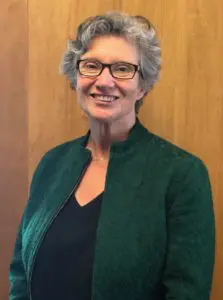 By Linda Jackson, AAI Program Director
By Linda Jackson, AAI Program Director
On my refrigerator is a list of every meal I’ve made over the past 57 days. In just a few days, it will have been two months since the world changed forever. Fourth of July. The Battle of Fort Sumter. Black Friday. The day that will live in infamy. 9/11. The murders of Kennedy and MLK. And, now, add The Coronavirus. These are distinct moments when we realized that the world was irrevocably altered. With each one, we saw people rising up in response and, alas, destruction. We are at the beginning of the coronavirus epidemic. I have bittersweet early March memories of a dinner with friends, coffee with AAI staff, meetings at the County, plans to travel to Turkey (I would be in Ephesus today), and anticipation of seniors graduating from high school. We saw the wave of COVID-19 coming, landing on the west coast and spreading slowly across the country. How fortunate are we to be in Marin, with a great healthcare system (think Kaiser, MarinHealth, and the Community Clinic). Nearly everyone (95 percent, by some estimates) complied with the shelter-in-place guidelines. When our economic system pushed the ‘pause’ button, the AAI network went into collaboration mode: delivering food in new ways, engaging with people in new ways, and switching to zooming through the days. I add to my gratitude list the deliberate and thoughtful decisions by our California and Marin leaders. They share the facts with us on a daily basis. They explain the principles behind the guidelines, and give us an overview of what’s ahead. We are finding the public health and elected leaders accessible and responsive to our concerns and challenges. Out of each crisis and the resulting despair, our country has pulled out for the better. This time around, it really shouldn’t have to be so hard. What if the trillions of dollars being spent now had been invested in fully implementing the Affordable Care Act? What if the U.S. pandemic program had been kept current and prepared? What if U.S. immigration policies let states decide how immigrants could help with employment needs for homecare and healthcare workers? I have more questions. When will we have better protocols for older adults who become hospitalized or who are dying from coronavirus? People of all ages watched with horror the stories about isolated older people, sick people, and dying people. Social isolation has negative implications for health in terms of mental health, obesity, diabetes, and brain health. People who are sick or who have dementia are known to recover faster and stronger when visited and aided by family membersand friends. People who are dying should be given the same presence, care, and comfort as babies coming into the world. We must have protocols to make it safe for people of all ages to be with their loved ones. When will we have a better understanding of how older adults of different ages and with different  underlying health conditions are affected by the virus? I am struck by the fact that the group of people 65 and older spans 40+ years. All other age groups cover a 15 to 18 year span. Why aren’t older people grouped into 65-79, 80-94, and 95+ cohorts? After all, a 65 year old is of a different generation than a 80 year old, who again is a different generation from someone over 100. Clumping all people 65 and over into one group is as outdated a concept as clumping all people aged 0-34! When will older adults be able to work again? Because Marin is home to so many older adults, they make up a large part of the local economy. They volunteer, an activity providing meaning that is essential to the mental health of many who have retired. They eat in restaurants, support the arts, and shop. And they work, and many must work to pay their living expenses. They need to be allowed, with masks and gloves and safe distancing, to be allowed to rejoin the economic world along with their younger coworkers. As Marin moves forward, having had a resounding 90+ percent compliance with the County’s health guidance, we are poised to move our older county carefully and thoughtfully toward recovery. Marin will not be the same a year from now. Working together, speaking up together, and being patient together, we will make Marin a better place than ever for people to live their whole lives.
underlying health conditions are affected by the virus? I am struck by the fact that the group of people 65 and older spans 40+ years. All other age groups cover a 15 to 18 year span. Why aren’t older people grouped into 65-79, 80-94, and 95+ cohorts? After all, a 65 year old is of a different generation than a 80 year old, who again is a different generation from someone over 100. Clumping all people 65 and over into one group is as outdated a concept as clumping all people aged 0-34! When will older adults be able to work again? Because Marin is home to so many older adults, they make up a large part of the local economy. They volunteer, an activity providing meaning that is essential to the mental health of many who have retired. They eat in restaurants, support the arts, and shop. And they work, and many must work to pay their living expenses. They need to be allowed, with masks and gloves and safe distancing, to be allowed to rejoin the economic world along with their younger coworkers. As Marin moves forward, having had a resounding 90+ percent compliance with the County’s health guidance, we are poised to move our older county carefully and thoughtfully toward recovery. Marin will not be the same a year from now. Working together, speaking up together, and being patient together, we will make Marin a better place than ever for people to live their whole lives.


